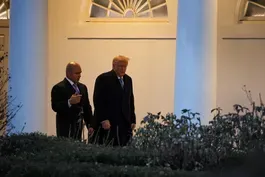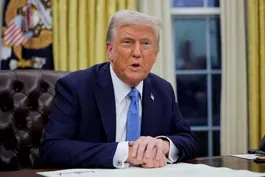
Brooks and Capehart on Trump's tariffs and spending freeze
Clip: 1/31/2025 | 9m 53sVideo has Closed Captions
Brooks and Capehart on Trump's new tariffs and spending freeze chaos
New York Times columnist David Brooks and Washington Post associate editor Jonathan Capehart join Amna Nawaz to discuss the week in politics, including the confusing policy rollouts, contentious confirmation hearings and new tariffs marking the second week of this Trump administration.
Major corporate funding for the PBS News Hour is provided by BDO, BNSF, Consumer Cellular, American Cruise Lines, and Raymond James. Funding for the PBS NewsHour Weekend is provided by...

Brooks and Capehart on Trump's tariffs and spending freeze
Clip: 1/31/2025 | 9m 53sVideo has Closed Captions
New York Times columnist David Brooks and Washington Post associate editor Jonathan Capehart join Amna Nawaz to discuss the week in politics, including the confusing policy rollouts, contentious confirmation hearings and new tariffs marking the second week of this Trump administration.
How to Watch PBS News Hour
PBS News Hour is available to stream on pbs.org and the free PBS App, available on iPhone, Apple TV, Android TV, Android smartphones, Amazon Fire TV, Amazon Fire Tablet, Roku, Samsung Smart TV, and Vizio.
Providing Support for PBS.org
Learn Moreabout PBS online sponsorshipAMNA NAWAZ: Contentious confirmation hearings and confusing policy rollouts marked the second week of this Trump administration.
For insights into it all, we're joined by Brooks and Capehart.
That is New York Times columnist David Brooks, and Jonathan Capehart, associate editor of The Washington Post.
Great to see you both.
JONATHAN CAPEHART: Hey, Amna.
AMNA NAWAZ: A lot happened this week.
AMNA NAWAZ: The week began, for those of you who are following along, with the introduction of this OMB memo, right, rescinding -- and, rather, saying that some federal funds and grants had to be frozen.
It was rescinded within 48 hours of being issued after mass confusion about what exactly was impacted.
The week is ending with a lot of chaos and confusion around President Trump's tariff threats, including against some of our allies, like Canada and Mexico.
David, this is the second week of the Trump administration.
What are you taking away just from the scope of the way things have been messaged and rolled out this week?
DAVID BROOKS: We have already hit peak incompetence.
So, if you say the Trump administration wants to defund DEI, fine, they ran on that.
They can try to do that.
You find the DEI programs or any programs you don't like, and you target them and you say, we're going to try to get rid of these programs.
But, instead, they have a two-page memo to eliminate, allegedly, 3 -- what they call $3 trillion in federal spending.
AMNA NAWAZ: Right.
DAVID BROOKS: This is like trying to cure acne with decapitation.
Like, it's just massive.
And it threw the whole country, universities, nonprofits, government officials, into total chaos.
And so it seems like nobody had the sense to say, well, what would happen next if we threw out in two pages with no clarity what's about to happen?
Well, of course the world's going to blow up at you.
And, of course -- and this, I hope, is the pattern for the Trump administration.
When they do something that's hurts Donald Trump standing, he pulls it back.
Then they end just today with tariffs.
And G.K. Chesterton, the British writer, said that civilizations decline when they forget the obvious.
And one of the obvious things is, tariffs are really bad for a country.
In 1930, we had the Smoot-Hawley Tariff, we all learned this in high school, which turned a financial crisis into a global recession by cutting trade flows.
Now, this won't be that bad, but it'll have the effect of a financial crisis on Canada and on Mexico.
All the things you want in an economy that are good get worse under tariffs.
You get lower wages, you get lower productivity, you get lower supply chain flows.
So, to me, it's another self-destructive policy.
And so we have seen these two cases of just basic reasonable competence not being followed.
AMNA NAWAZ: Jonathan, how do you look at it?
JONATHAN CAPEHART: We're 11 days in, and I'm resisting calling this chaos or confusion, because what this really is, is, this is what he ran on, taking a wrecking ball to the government.
This is what happens when you believe that the government is completely woke, however they're defining it.
And so you put out a memo saying, we're freezing funding.
We're doing all these things that will hurt people.
That press conference yesterday -- let's just zero in on the press conference the president did yesterday, talking about a tragedy in the Potomac, 67 souls gone, and he gives lip service.
He does a -- fine, he does a moment of silence, and then spends the next 25 minutes saying some of the most racist things I have ever heard come out of the White House, come out of the White House Press Briefing Room, come out of the mouth of the president of the United States, scapegoating anyone who isn't white, Christian, male, straight, for problems in the country, and then deflecting blame onto past presidents, Democratic presidents.
This is all -- he ran this way.
He said he was going to do these things.
And, right now, all we can do is sit back and pray that the wrecking ball doesn't destroy us.
AMNA NAWAZ: Well, he's still continuing to pull his team together as well.
We know a number of his key nominees had their confirmation hearings on Capitol Hill, including Robert F. Kennedy Jr. for HHS, Kash Patel to lead the FBI, and Tulsi Gabbard as the -- as DNI.
There were a couple of moments I want to get your take on, though, that seemed to reveal some Republican concerns about Gabbard and Kennedy in particular.
Just take a listen to these.
SEN. BILL CASSIDY (R-LA): Will you reassure mothers, unequivocally and without qualification, that the measles and hepatitis B vaccines do not cause autism?
ROBERT F. KENNEDY JR., Health and Human Services Secretary Nominee: Senator, I am not going into the agency with any... SEN. BILL CASSIDY: Well, that's kind of a yes-or-no question, because -- so, if you're -- because the data is there.
And that's kind of a yes or no.
And I don't mean to cut you off, but that really is a yes or no.
ROBERT F. KENNEDY JR.: If the data is there, I will absolutely do that.
SEN. JERRY MORAN (R-KS): I want to make certain that in no way does Russia get a pass in either your mind or your heart or in any policy recommendation you would make or not make.
FMR.
REP. TULSI GABBARD (HI): Senator, I'm offended by the question, because my sole focus, commitment and responsibility is about our own nation.
AMNA NAWAZ: Just as a reminder, the overwhelming data shows no link between vaccines and autism.
And Gabbard has previously blamed the U.S. and NATO for Russia's war in Ukraine.
But, David, when you look at this and you hear some of those concerns, do you think these senators still back these nominees, despite those concerns?
DAVID BROOKS: Yes, what I heard in these two cases in particular was senators, Republican senators, saying to the nominees, that crazy thing you believe, you don't really believe that, right?
Would you please just make it easier for me to vote for you by telling me you don't really believe that?
And, in both cases, the nominees said, man, I'm not going to tell you I believe it, but I'm not going to tell you I don't believe it.
And so they didn't make it very easy on these Republican senators.
I actually think Tulsi Gabbard's in a little harder place, because, A, there's a much broader phalanx of Republicans who are skeptical about her.
Second, the Intelligence Committee is a serious committee.
That's a committee that usually meets in private.
So it's not usually a committee filled with histrionic behavior.
It's filled with reasonable behavior.
And they really do know intelligence.
And there are parts of the intelligence effort that she really is a threat to, a potential threat to.
There's something called 702 of the FISA thing... AMNA NAWAZ: Right.
DAVID BROOKS: ... which is a way to -- we have to look at foreign terrorists and follow what they're doing and sort of head off a terrorist act.
And she wants to raise the bar allowing us to use that ability.
And so that is a serious threat to people who subsequently care about intel issues.
And so I think she's in a little more danger.
Kennedy, it looks to me like he may go through it, unless you get somebody outside the committee, like Mitch McConnell, come in and do something.
AMNA NAWAZ: But you think Republican senators may vote against Tulsi Gabbard?
Is that what you're saying?
DAVID BROOKS: What do I know?
But 60/40 they vote for her, which is low for -- by Republican standards, that's pretty low odds for her.
AMNA NAWAZ: Jonathan?
JONATHAN CAPEHART: Look, if -- one of the three could go down, the -- Kash Patel for FBI, which I don't think, given the hearings, he might not -- he probably might get through.
Tulsi Gabbard, she's the one we have consistently talked about being the one on the edge, and then RFK Jr.
But, look, I remember when Pete Hegseth was named as Donald Trump's pick for defense secretary and immediately Senator Joni Ernst expressed concerns, valid concerns, and expressed them clearly.
He's now secretary of defense and she voted for him.
So I would love to be -- I'm always just sitting here saying... AMNA NAWAZ: We should note three Republicans did vote against him, right... JONATHAN CAPEHART: Right.
AMNA NAWAZ: ... Collins, Murkowski, and McConnell.
JONATHAN CAPEHART: Correct.
And yet he is still secretary of defense.
AMNA NAWAZ: Vice President Vance broke the tie.
JONATHAN CAPEHART: Right, right, right.
I say this often on this program.
I hope I'm proven wrong that no one is going to vote against any of these people.
But we will see.
AMNA NAWAZ: Before we let you go, I need to ask you about the Democrats, because they are choosing really their direction forward tomorrow.
They will vote for their DNC chair.
Jonathan, you and your colleagues at MSNBC just hosted the forum for the candidates last night.
What's your takeaway?
Does this party have a direction?
JONATHAN CAPEHART: The party has a direction.
Let me say this.
I hesitated a bit.
They are not unclear on what they stand for.
What they are struggling with is, how do they convince the American people that they are where the American people said in the election they didn't think they were, that somehow the Republicans are now the party of the working class and care about the American people and the Democrats are the ones who are in league with billionaires and the elites?
What I took away from that -- from the forum last night is that they are more concerned about misinformation, disinformation, getting the message out and how do they catch up with the incredible infrastructure that is there on the right.
And so one thing I noticed is that, as each candidate was talking about what they wanted to do or what they thought or the direction of the party, you saw heads nodding all over the stage.
And so while there are eight people, maybe half of them are -- actually stand a chance.
Maybe half of the half stand a chance.
We will see.
But the Democrats -- trust me, the Democrats aren't in trouble.
AMNA NAWAZ: I want to give David 30 seconds to respond here.
DAVID BROOKS: Democrats are in big trouble.
DAVID BROOKS: Listen, their whole world view has been blown apart.
They thought of themselves as the party of the marginalized.
They're now the party of the college-educated on the coast.
They thought they could spend a lot of money, but it turns out that's kind of inflationary.
They didn't think a lot of Black and brown voters were going to vote for Donald Trump.
Like, they should take a year off, my Democratic colleagues, take -- do some serious thinking, because a lot of your mental categories have to be reinvented and reimagined.
JONATHAN CAPEHART: They don't have a year.
AMNA NAWAZ: We will come back to talk about this some more.
David Brooks, Jonathan Capehart, always great to see you.
Thank you.
JONATHAN CAPEHART: Thanks, Amna.
Helicopters restricted near D.C. airport after collision
Video has Closed Captions
Helicopter flights heavily restricted near Washington airport after midair collision (8m 4s)
Musicians work to forge relations between U.S. and Cuba
Video has Closed Captions
Musicians use their art as a gateway to better relations between the U.S. and Cuba (10m)
News Wrap: Judge blocks Trump's plans to freeze grants
Video has Closed Captions
News Wrap: Judge blocks Trump's plans to freeze federal grants and loans until Monday (5m 17s)
Syrian revolutionary describes his vision for rebuilding
Video has Closed Captions
Syrian revolutionary describes his vision for rebuilding after 13 years of civil war (7m 28s)
UNRWA vows to keep providing aid to Gaza despite Israeli ban
Video has Closed Captions
UNRWA vows to keep providing aid to Gaza despite Israeli ban (7m 57s)
What we know about Trump's tariffs on Mexico, Canada, China
Video has Closed Captions
What we know about Trump's plan to slap tariffs on Mexico, Canada and China (3m 24s)
Providing Support for PBS.org
Learn Moreabout PBS online sponsorshipMajor corporate funding for the PBS News Hour is provided by BDO, BNSF, Consumer Cellular, American Cruise Lines, and Raymond James. Funding for the PBS NewsHour Weekend is provided by...


















